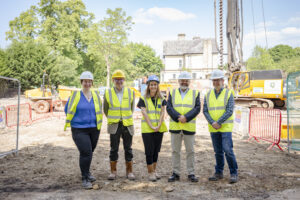
The shortage of planners has been well-known for over a decade; local authority planning staff fell by 15% between 2006 and 2016.
In a sector facing the challenge of recruiting and retaining sufficient planners, it’s imperative that the profession becomes more attractive to the next generation. In the latest instalment of our ‘Transformational Leaders’ series, Marek Dobrowolski, associate partner and Berwick Partners’ Place and Regeneration lead, talks to Caroline Harper, chef planning director of Be First about her transition from a corporate role in to the public sector as well as her plans to build a ‘planning super service’ at Be First.
It has been almost two years to the day since I first met Caroline Harper, and as it panned out, successfully convinced her to join Be First, LB Barking & Dagenham’s highly innovative and dynamic regeneration company. At the time Be First was only a few months old, and so on paper for her it was quite a risk.
It was also quite a departure for JLL’s first female London Planning Director, described to me during the search as ‘one of the most talented, committed and gogetting place-makers in the country’ to swap a corporate, private sector role for a quasi-public sector position. Over coffee we caught up to discuss why she left behind a career in academia for planning, her views on the sector and her aims to see Be First become one of the most highly sought-after planning departments in the UK.
So how did you end up becoming a planner?
I have always been hugely interested in places and cities and how they are used, but despite starting a Geography PhD, I was never convinced that a career in academia was for me.
So, I dropped out, moved back to London from Canada and started temping at a recruitment agency. While there, I found myself extra things to do, to fill my work day, and one of the Partners noticed and asked me what I wanted to do.
This led to various interviews in planning, at charities and in advertising. And I took the Graduate Planner job offered to me by CBRE. Things have gone from there.
How did you adapt to the change in setting?
It was quite a departure! There was a flow through from my research interests but moving from a very left-leaning academic environment to a corporate role within the property sector was a big shift. I was nervous about this before my interview with CBRE, but when Stuart Robinson, who headed up their Planning Team at the time, rocked up in a leather trench coat and leather trilby, I figured everything would be fine!
Since then, I have benefitted from working with some great people like Jon Stoddart and Jeff Field, both of whom gave me the freedom to get on with things while helping me learn and gain experience. I also just really enjoy that planning pivots on translating the words on a page (i.e. policy) into physical built environments, and that there is a myriad of ways that you can do that translating depending on the desired outcome.
It means having to adapt and think creatively about solutions and outcomes.
I like the buzz of that, all set within the dynamic, ever-changing character of cities.
Adaptability, creativity, buzz, not words many associate with planning. We have been experiencing a shortage in planners for well over a decade now, almost two. Is this an image issue based on ignorance or professional snobbery or more-deep rooted do you think? Are we producing place makers or planning processors?
The shortage of planners, and good planners at that, is a massive issue and you and I have spoken about this before.
It frustrates me that a lot of the time planning is seen as this immovable hurdle, resulting in a robotic, process-driven approach that ignores the end game, regardless of whether that’s good or bad development.
Fundamentally, planning is just a tool and the way it operates in this country means a lot of things are open to negotiation. Good planners, and by default good planning, have and has the wherewithal to be able to drive this negotiation to allow, support, promote, and at times manipulate, the delivery of good places.
We really need to see planning in terms of a multiplicity of elements within the development process, and in terms of how it straddles so many areas that are part of our lives: law; architecture; design; economics; social policy. This makes planning exciting – look what you can deliver if you use it to facilitate! Becoming a planner should never be about wanting to bury yourself in reams of words, and then continually saying no, we don’t do it like this, or that’s not the way we do things, ignoring the bigger picture. That’s not enough.
People should want careers in planning because of the variety and excitement of the work they will do, and the profound difference it can make to communities.
I’d love to see planning qualifications becoming more cognizant of this. I do not consider my Planning Masters was in any way reasonable preparation for my job and was fortunate to complete it part time while at CBRE so understood this.
I think this is one of the reasons I am relatively dismissive of people moving up the career ladder based primarily on qualifications achieved and time spent; experience is important of course, but it’s your attitude and how you use that experience that is key. Working in a senior role in the industry, I think I have a responsibility for ensuring people can move forward, and as a sector, planning should be emphasising the practical aspects of the role and the buildings and places it helps deliver
From CBRE you moved to JLL and then, two years ago, we spoke about this unique organisation that LB Barking and Dagenham were creating, and the opportunity to come in and lead a new Planning function. It clearly appealed, nearly two years on, how have you found it?
The challenges and learning curve have been huge. The projects we work on are the stuff of career dreams, and the responsibility and freedom to shape the Planning & Building Control Team to support the development and growth of the Borough is incredibly exciting.
We offer something different, straddling the public and private sectors, and the scope to work commercially, whilst delivering social value is something, I really believe in. It’s also been hard. It has challenged my perceptions of the public and private sectors and how they need to work together.
I want my team to combine the best of both worlds, not just in Planning Consultancy but also in the statutory planning and building control services which we provide. Be First and my team are evolving, and the politicians and council are also evolving as they adapt to how we go about delivering what they have asked us to deliver.
What has surprised you the most since you made the move and what has it taught you?
The perception of the public sector is overt bureaucracy, but you get that in a different way in the private sector, so this wasn’t too much of a surprise. Something that I have learnt much more about is around the political dimension. The nature of politics means that you will never satisfy everybody, but there are clear benefits of putting effort into working closer with politicians, and with the communities that they represent.
One of our roles is to better inform and better educate on issues, including the limitations of planning in resolving some of those issues. This focus on communication, on engagement and adaptability is something I really stress to the team at Be First.
At some point I’d like to see this engagement carried through in different ways to Planning Committee, mixing up the membership to include architects and other technical experts, as well as local employers and residents to sit alongside Members so that we have more collective views and opinions when determining planning applications, and therefore buy in to development.
Tell me about the team you are building the team at Be First.
I want my team to be the best; a renowned planning super service comprising planning consultancy alongside the statutory planning and building control services.
We have so many of the ingredients: a clear vision and remit; political support; and the sites. I want the team’s views, opinions and expertise to be highly sought and highly regarded across the property sector, building on our unique perspective because we sit at the junction of the public and private sectors.
Planning consultants spend a lot of time claiming how much they know local authorities; we are actually operating in it, and our team comes from commercial backgrounds. We are a step ahead. Planning Policy should be proactive and strategic, analysing research and really thinking about what transport and infrastructure, social and physical, communities are going to need to thrive in the future.
Across the whole team, we will be utilising technology and artificial intelligence to free up people’s time from the routine, box-ticking stuff. I want people to be thinking about how we can do things better and what we might need to do that, how to factor in changes in technology and employment and how to mitigate risks and seize opportunities.
We can learn a lot from what happens in other cities and countries, and from other sectors. I am looking for some senior colleagues to help me here: one to head up Planning Policy, Infrastructure & Transport Policy; the other to be a deputy working alongside me so that we can get the strategy for Be First Planning & Building Control right. That’s a plug for people who want to come and work in the UK’s future best planning consultancy – come and help create it!
So, if you could meet your student self, at that point when you were thinking of dropping your PhD, would you still tell her to go into planning?
I believe if you commit to something then you should do it to the best of your ability and put everything into it. I found in planning a sector that I am passionate about, and one in which when I apply those principles has created a world of opportunity, so yes, absolutely.
For more information on Be First, visit here.
http://newstartmag.co.uk/job/deputy-chief-planner-head-of-operations/
http://newstartmag.co.uk/job/head-of-planning-policy-transport-infrastructure-planning/


















Leave a Reply